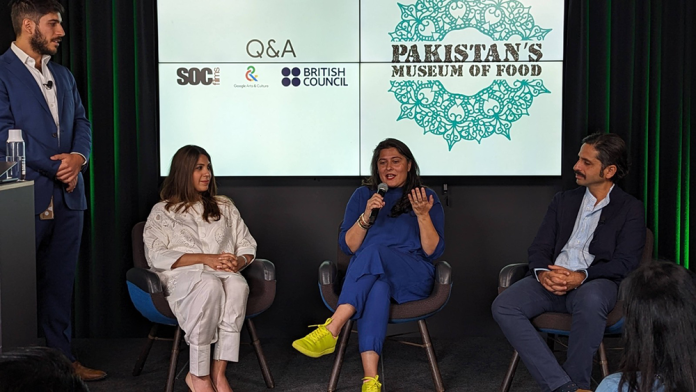Sharmeen Obaid-Chinoy, in collaboration with Google Arts & Culture, and the British Council, proudly launched ‘Pakistan’s Museum of Food’, a digital hub featuring the rich and diverse culinary landscape of Pakistan.

‘Pakistan’s Museum of Food’ is the largest and most comprehensive exploration of Pakistani cuisine online, featuring over 9000 Images, over 90 videos and over 100 stories that capture the vibrant culinary tapestry of Pakistan’s five provinces and beyond, seamlessly interwoven with recipes from the diaspora, an essential contribution from their UK-based co-creators, W.M.Legacy. The project aims to preserve and celebrate the culture and heritage of Pakistani food, as well as to document its dynamic evolution and progression.

Project Director, Sharmeen Obaid-Chinoy, said, “Pakistan’s culinary heritage is an intrinsic part of the country’s cultural identity, but with the passing of generations and the challenges brought about by climate change, certain domestic practices and traditional recipes are at high risk of being lost. In response to this looming crisis, we embarked on a mission to not just reminisce about the flavors of yesteryears, but to actively preserve and revitalize the vanishing recipes and customs that define our past. We hope that this project will inspire people to explore, appreciate, and enjoy the vibrant culinary culture, lineage and food practices of Pakistan, as well as to contribute their own stories and recipes to this living narrative.”

Amit Sood, the Director and founder of Google Arts & Culture, said “An online feast for the senses, we’re thrilled to unveil our latest exhibition on Google Arts & Culture dedicated to the vibrant flavors and rich culture of Pakistan. From the mountains of the north to the bazaars of the south, Pakistan is a land of diverse landscapes and traditions, all of which are reflected in its cuisine. We hope users can fully immerse themselves in the many wonders of this amazing country through our largest digital hub about Pakistan, developed in close collaboration with Sharmeen Obaid Chinoy and the British Council”

The Director Arts Pakistan at the British Council, Laila Jamil said: “We are delighted to have supported this important project highlighting Pakistan’s diverse culinary practices which have been beautifully collated and shared by our partners. This support was possible through our Gender Ecologies Grant Programme, which explores the intersection of women, climate change and the arts. Food cultures give us insights into people’s customs, agricultural traditions, climatic conditions and their flora and fauna. They also have a direct impact on our health, the health of our planet and our understanding of self. We hope this ‘Museum of Food’ acts as a platform to inspire a wider effort to collect and share these practices and a chance to explore the stories that come with them.”

Together with Google Arts & Culture, Sharmeen Obaid-Chinoyand her team explored the genesis of iconic dishes across all five provinces, capturing the essence of Pakistan’s culinary and cultural diversity. From the coastal allure of Gwadar’s seafood to Multan’s decadent Sohan Halwa, and the innovative incorporation of yak meat in Hunza, the crew traveled through Pakistan’s varied terrain to illuminate how regional topography molds the nation’s distinct eating patterns. Venturing to a multitude of eateries across the country, Sharmeen and her cohort of filmmakers aimed to capture the essence of traditional dining practices while tracing the nuanced impact of modernization on the nation’s evolving taste palate.

The project covers a wide range of topics, such as:
- The impact of climate change on eating habits and the efforts of organizations like PODA (Potohar Organization for Development Advocacy), run by Samina Nazir in Chakwal, that promote sustainable agricultural practices.
- The role of women in preserving culture and cuisine and their substantial contributions to the agricultural sector.
- The distinct ingredients that define Pakistani flavors, such as Kunri’s red chilis, Pasni’s salt, Ranipur’s sugarcane, and Empress Market’s spices.
- The multitude of communities residing within Pakistan that have their own cherished traditional dishes, such as Parsis, Goans, Hazaras, Bohris, and Gujaratis.
- The provenance and cultural significance of iconic dishes across the country, such as Pata Tikka, Bhe ke Pakore, Kaak Bread, Chapshoro, and Khaddi Kebab.
- The culinary diversity of Pakistan’s regions, from Karachi’s lively Burns Road to Peshawar’s renowned meat-centered offerings, from Gwadar Port’s coastal cuisine to the Hunza Valley’s organic delicacies.
- The esteemed eateries across the country that epitomize local flavors and traditions, such as Cafe Thar, Nisar Charsi Tikka, Quetta Alamgir Hotel, and Bohra Dastarkhwan.
- The meticulous craftsmanship and intricate cooking techniques that are intrinsic to Pakistani cuisine, such as sun-drying and re-hydrating vegetables in Thar, preserving Lahndi meat in Balochistan, and crafting lentils into Vadiyun and Papar in Upper Sindh.
- The preservation of heirloom recipes passed down for generations, such as Azra Syed’s Biryani and Zarda, and PJ’s jars’ achaars.
- The vibrant street food culture that reflects the regional tastes and seasonal produce, such as Gola Ganda, Samosas, Biryani, Kulfi, and Gur.
- The diverse eating practices and the communal aspect of food that foster connections and nurture a sense of community, such as shared dining experiences at Dastarkhwans.
- The stories from the global Pakistani diaspora that enrich the understanding of how culinary heritage transcends borders.

‘Pakistan’s Museum of Food’ comes together in the form of an interactive website where visitors can explore a virtual gallery showcasing carefully selected films, captivating photographs, and cherished recipes. The website is not just a repository; but an immersive experience that invites exploration, storytelling, and a deeper connection to the rich food traditions that bind us together. The Partners are dedicated to the continual enrichment of this living narrative and eagerly open their doors for contributions from all corners of the world. As the project celebrates Pakistan’s culinary heritage and its dynamic progression, it embraces a collaborative spirit, inviting individuals to join in its pursuit to archive Pakistan’s culinary landscape.
The website can be accessed at https://goo.gle/pakistanfood
For more information, please visit: https://socfilms.com/


